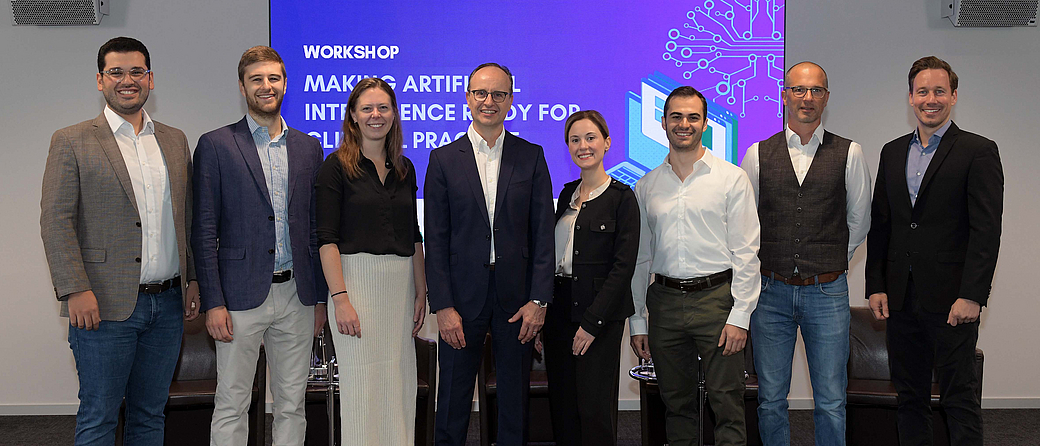The DR-AI Research Consortium presented its subprojects and state-of-the-art findings in the fields of artificial intelligence in dermatology and radiology vis-à-vis a hybrid audience in Munich on September 1st, 2023. DR-AI is a research collaboration between TUM Informatics and TUM Medical Ethics as well as LMU Dermatology and LMU Radiology devoted to artificial intelligence (AI) applications for medical purposes.
What can computer science contribute to transfer AI to clinical practice?
Prof. Lars French's opening speech was followed by PD Dr. Tobias Lasser presentation on the latest findings and developments of his TUM research group “Computational Imaging and Inverse Problems” in the context of clinical decision support in radiology and dermatology respectively. While AI algorithms already excel in correctly identifying diseases in certain application scenarios, such as lung diseases in X-ray radiographs or skin diseases in photographs, several elements for daily clinical usage are still missing representing the focus of Dr. Lasser’s research group. One example are novel fusion schemes merging images with additional patient information for better diagnostic quality. Another example was the proof that tiny image details that are routinely discarded have – not surprisingly - high relevance on algorithms’ outcomes.
Yet another example is related to the interpretability of the algorithms’ outcomes, so that doctors better understand how to apply algorithms in clinical practice, thereby building trust and providing support. Last but not least patient data can be excluded for which algorithms cannot make an accurate prediction due to limitations in training data set. Alessandro Wollek, a doctoral candidate in Dr. Lasser’s research group, presented several of those novel findings in detail during his presentation.
Artificial Intelligence in dermatology
Dr. Sebastian Krammer’s presentation outlined the group's research studies on detection of skin diseases using image analysis. Stressing how digitization with so-called software Avelios contributed to documentation efficiency at LMU University Hospital, Dr. Krammer exemplified up to 2,000 structured data points in case of a single patient treatment. Based on this meta data abundance, a new algorithm for detecting skin diseases has been developed characterized by a multimodal, multistep data integration process.
Artificial Intelligence in radiology
Prof. Michael Ingrisch, Director of the LMU Clinical Data Science Group, is convinced that asking the right questions - clinical questions with clinical relevance - is crucial. Above all, it would be important that these questions are answered in a clinical context, e.g. by using AI systems on critical subgroups.
PD. Dr. Bastian Sabel discussed gradual implementation of AI in radiology, i.e. phase by phase, in his lecture. Despite the advantages of this technology, he emphasized the need to address ethical and practical concerns, especially regarding data privacy and the role of human expertise in an increasingly digital medical landscape.
Embedded Ethics: Integration von Ethik in die Entwicklung von KI für die Medizin
Prof. Alena Buyx's TUM Embedded Ethics team reported on how they embedded ethics within the consortium’s project setting. As of now, “ethics” is often perceived as an afterthought. Therefore, the team’s mission is to bring ethics “to the workbench”, for example by discussing ethical issues as soon as they arise. In the context of the DR-AI project, the aforementioned approach was implemented by conducting an interview study with all participants and carrying out ethnographic fieldwork. The study’s results stress researcher’s responsibility in machine learning development processes and, contribute to high-quality decision-making in medicine. Besides offering insights into biomedical ethics research, the team’s work package provided an early example of successful embedded ethics application and yielded essentials tailoring the approach closer to computer scientists’and clinicians’needs.
The DR-AI Research Consortium concluded its workshop with a panel discussion allowing for discussion as well as providing a shared problem-solving stimulus. In the discussion, the successful translation of state-of-the-art machine learning algorithms to clinical practice was unanimously identified as a continuous challenge. Further, the need for a well-developed digital infrastructure as development environment and the lack of structured data were highlighted.
Alena Buyx says: “The DR-AI workshops have demonstrated how fruitful it is to bring together a consortium of clinicians, computer scientists, and ethicists to develop state-of-the-art machine learning healthcare research. The workshops served as a shared space where we could present our findings but, most importantly, go off each other’s ideas. The discussions leveraged the potential of interdisciplinary working and gave us new insights into what is needed to create dermatological and radiological algorithms corresponding to the highest ethical standards. We look forward to continuing our discussions in new projects and hope for the successful continuation of cross-clinic and cross-university initiatives like DR-AI.”
“All in all, this workshop created the space for a fruitful and productive day of learning and sharing ideas among all attendees and speakers”, said Prof. Lars French, head of the DR-AI Working Group. Building on its workshop success, findings and strong partnership ties within the AI research community, the DR-AI Research Consortium members will continue to comprehensively and sustainably tackle AI challenges in the future.
Text: Isabel Hartmann
More Information
- The DR-AI research collaboration is led by Prof. Lars French, Director of the Clinic and Polyclinic for Dermatology and Allergy at LMU University Hospital Munich.
- The German Federal Ministry of Health supported this groundbreaking consortium with €2.4 million.
- Research groups at TUM involved in the project:
- More information on zu DR-AI
- More transparency for AI in diagnostics (Interview with computer scientist Alessandro Wollek and ethics researcher Theresa Willem, 05.06.2023)
